Critical Analysis of Zero-Hour Employment Contracts: Pros and Cons
VerifiedAdded on 2021/02/21
|7
|2042
|78
Report
AI Summary
This report provides a critical review of zero-hour employment contracts, examining their implications for both employers and employees. It explores the flexibility and cost-control benefits for firms, as well as the potential for exploitation and income instability for workers. The analysis covers various aspects, including financial and non-financial benefits, the impact on employee well-being, and the role of regulations. The report also discusses the advantages of zero-hour contracts, such as opportunities for additional work and skill development, while acknowledging the disadvantages like lack of job security and impact on social life. The conclusion highlights the need for a balanced approach to mitigate the negative aspects and ensure fair practices in zero-hour employment.
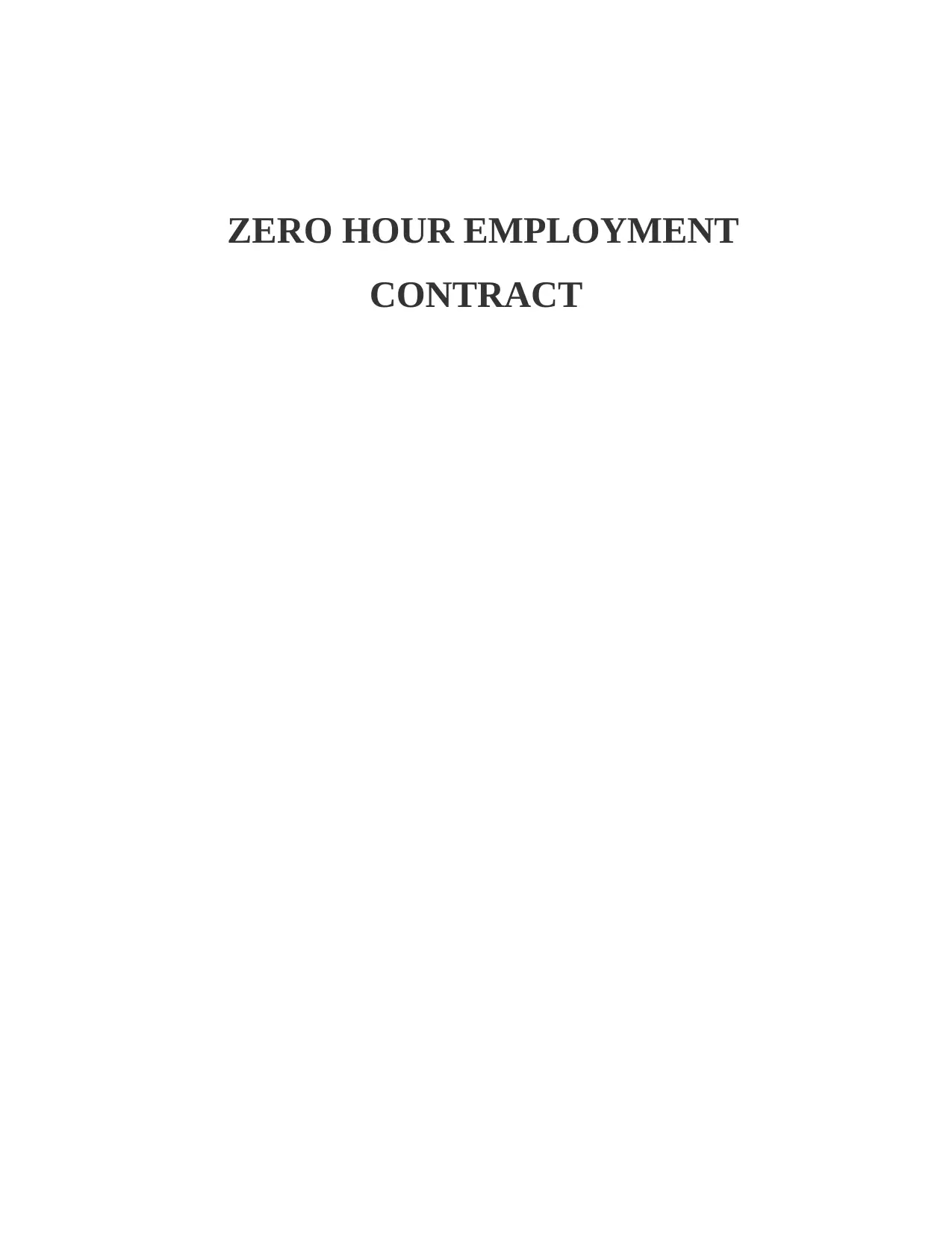
ZERO HOUR EMPLOYMENT
CONTRACT
CONTRACT
Paraphrase This Document
Need a fresh take? Get an instant paraphrase of this document with our AI Paraphraser
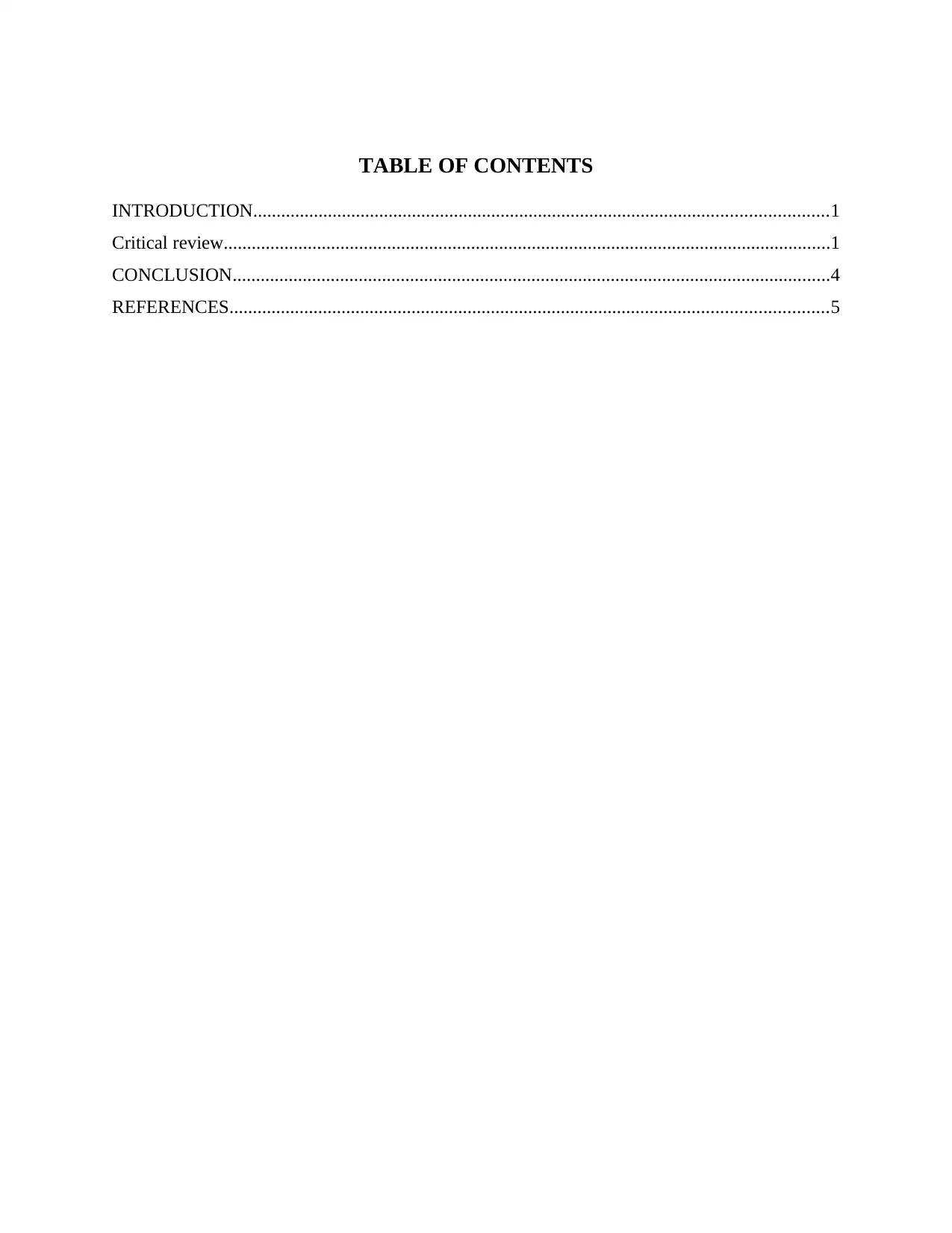
TABLE OF CONTENTS
INTRODUCTION...........................................................................................................................1
Critical review..................................................................................................................................1
CONCLUSION................................................................................................................................4
REFERENCES................................................................................................................................5
INTRODUCTION...........................................................................................................................1
Critical review..................................................................................................................................1
CONCLUSION................................................................................................................................4
REFERENCES................................................................................................................................5
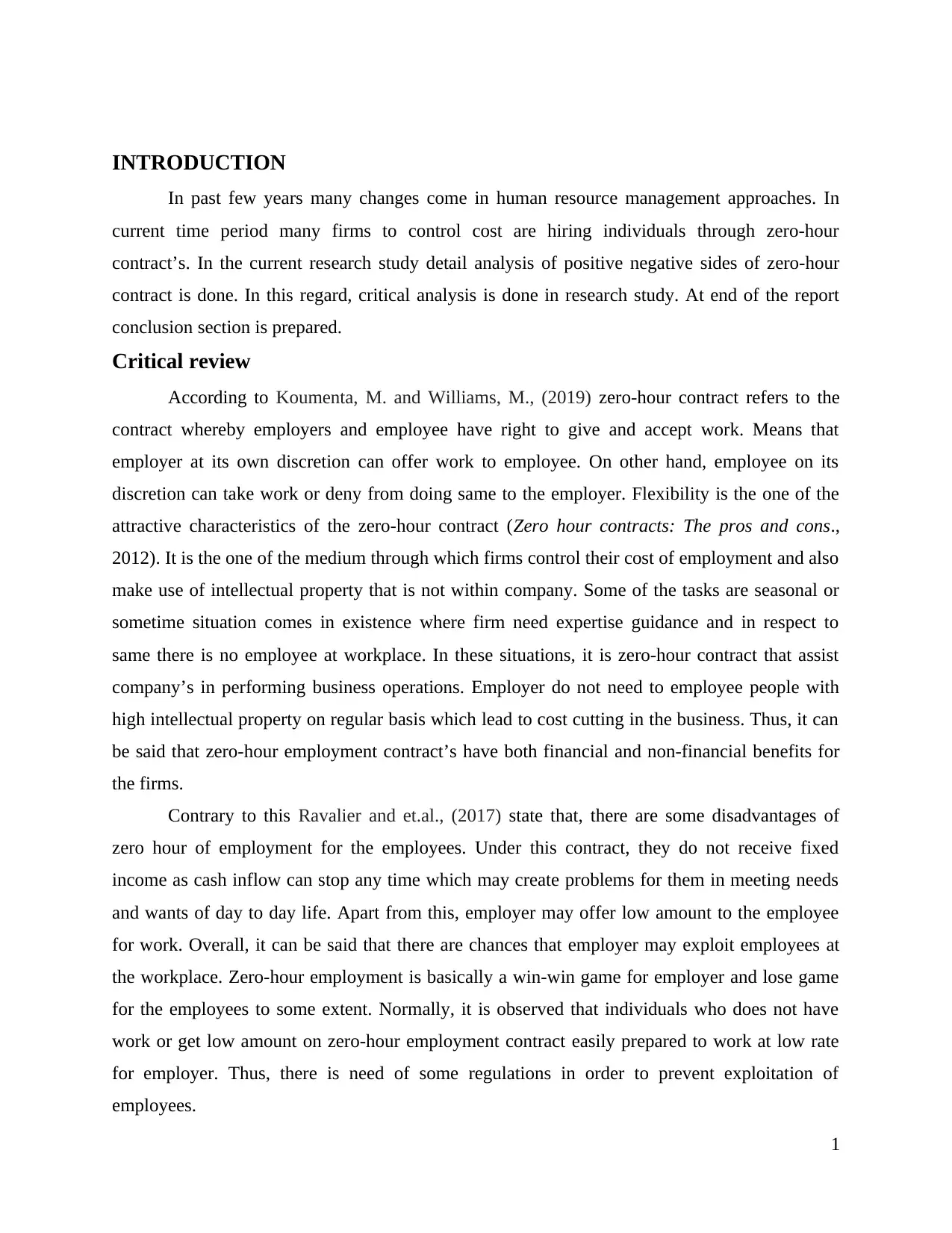
INTRODUCTION
In past few years many changes come in human resource management approaches. In
current time period many firms to control cost are hiring individuals through zero-hour
contract’s. In the current research study detail analysis of positive negative sides of zero-hour
contract is done. In this regard, critical analysis is done in research study. At end of the report
conclusion section is prepared.
Critical review
According to Koumenta, M. and Williams, M., (2019) zero-hour contract refers to the
contract whereby employers and employee have right to give and accept work. Means that
employer at its own discretion can offer work to employee. On other hand, employee on its
discretion can take work or deny from doing same to the employer. Flexibility is the one of the
attractive characteristics of the zero-hour contract (Zero hour contracts: The pros and cons.,
2012). It is the one of the medium through which firms control their cost of employment and also
make use of intellectual property that is not within company. Some of the tasks are seasonal or
sometime situation comes in existence where firm need expertise guidance and in respect to
same there is no employee at workplace. In these situations, it is zero-hour contract that assist
company’s in performing business operations. Employer do not need to employee people with
high intellectual property on regular basis which lead to cost cutting in the business. Thus, it can
be said that zero-hour employment contract’s have both financial and non-financial benefits for
the firms.
Contrary to this Ravalier and et.al., (2017) state that, there are some disadvantages of
zero hour of employment for the employees. Under this contract, they do not receive fixed
income as cash inflow can stop any time which may create problems for them in meeting needs
and wants of day to day life. Apart from this, employer may offer low amount to the employee
for work. Overall, it can be said that there are chances that employer may exploit employees at
the workplace. Zero-hour employment is basically a win-win game for employer and lose game
for the employees to some extent. Normally, it is observed that individuals who does not have
work or get low amount on zero-hour employment contract easily prepared to work at low rate
for employer. Thus, there is need of some regulations in order to prevent exploitation of
employees.
1
In past few years many changes come in human resource management approaches. In
current time period many firms to control cost are hiring individuals through zero-hour
contract’s. In the current research study detail analysis of positive negative sides of zero-hour
contract is done. In this regard, critical analysis is done in research study. At end of the report
conclusion section is prepared.
Critical review
According to Koumenta, M. and Williams, M., (2019) zero-hour contract refers to the
contract whereby employers and employee have right to give and accept work. Means that
employer at its own discretion can offer work to employee. On other hand, employee on its
discretion can take work or deny from doing same to the employer. Flexibility is the one of the
attractive characteristics of the zero-hour contract (Zero hour contracts: The pros and cons.,
2012). It is the one of the medium through which firms control their cost of employment and also
make use of intellectual property that is not within company. Some of the tasks are seasonal or
sometime situation comes in existence where firm need expertise guidance and in respect to
same there is no employee at workplace. In these situations, it is zero-hour contract that assist
company’s in performing business operations. Employer do not need to employee people with
high intellectual property on regular basis which lead to cost cutting in the business. Thus, it can
be said that zero-hour employment contract’s have both financial and non-financial benefits for
the firms.
Contrary to this Ravalier and et.al., (2017) state that, there are some disadvantages of
zero hour of employment for the employees. Under this contract, they do not receive fixed
income as cash inflow can stop any time which may create problems for them in meeting needs
and wants of day to day life. Apart from this, employer may offer low amount to the employee
for work. Overall, it can be said that there are chances that employer may exploit employees at
the workplace. Zero-hour employment is basically a win-win game for employer and lose game
for the employees to some extent. Normally, it is observed that individuals who does not have
work or get low amount on zero-hour employment contract easily prepared to work at low rate
for employer. Thus, there is need of some regulations in order to prevent exploitation of
employees.
1
⊘ This is a preview!⊘
Do you want full access?
Subscribe today to unlock all pages.

Trusted by 1+ million students worldwide
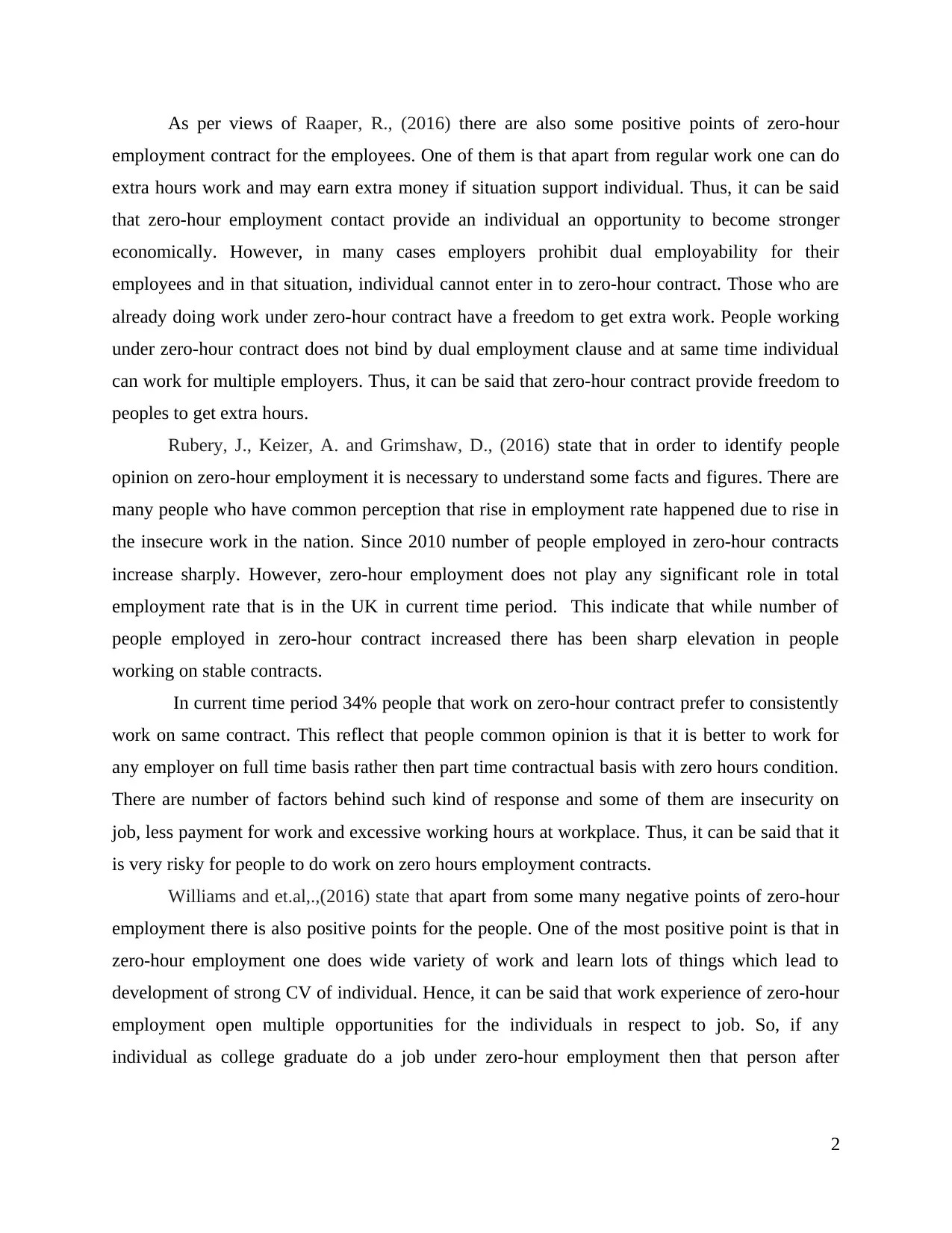
As per views of Raaper, R., (2016) there are also some positive points of zero-hour
employment contract for the employees. One of them is that apart from regular work one can do
extra hours work and may earn extra money if situation support individual. Thus, it can be said
that zero-hour employment contact provide an individual an opportunity to become stronger
economically. However, in many cases employers prohibit dual employability for their
employees and in that situation, individual cannot enter in to zero-hour contract. Those who are
already doing work under zero-hour contract have a freedom to get extra work. People working
under zero-hour contract does not bind by dual employment clause and at same time individual
can work for multiple employers. Thus, it can be said that zero-hour contract provide freedom to
peoples to get extra hours.
Rubery, J., Keizer, A. and Grimshaw, D., (2016) state that in order to identify people
opinion on zero-hour employment it is necessary to understand some facts and figures. There are
many people who have common perception that rise in employment rate happened due to rise in
the insecure work in the nation. Since 2010 number of people employed in zero-hour contracts
increase sharply. However, zero-hour employment does not play any significant role in total
employment rate that is in the UK in current time period. This indicate that while number of
people employed in zero-hour contract increased there has been sharp elevation in people
working on stable contracts.
In current time period 34% people that work on zero-hour contract prefer to consistently
work on same contract. This reflect that people common opinion is that it is better to work for
any employer on full time basis rather then part time contractual basis with zero hours condition.
There are number of factors behind such kind of response and some of them are insecurity on
job, less payment for work and excessive working hours at workplace. Thus, it can be said that it
is very risky for people to do work on zero hours employment contracts.
Williams and et.al,.,(2016) state that apart from some many negative points of zero-hour
employment there is also positive points for the people. One of the most positive point is that in
zero-hour employment one does wide variety of work and learn lots of things which lead to
development of strong CV of individual. Hence, it can be said that work experience of zero-hour
employment open multiple opportunities for the individuals in respect to job. So, if any
individual as college graduate do a job under zero-hour employment then that person after
2
employment contract for the employees. One of them is that apart from regular work one can do
extra hours work and may earn extra money if situation support individual. Thus, it can be said
that zero-hour employment contact provide an individual an opportunity to become stronger
economically. However, in many cases employers prohibit dual employability for their
employees and in that situation, individual cannot enter in to zero-hour contract. Those who are
already doing work under zero-hour contract have a freedom to get extra work. People working
under zero-hour contract does not bind by dual employment clause and at same time individual
can work for multiple employers. Thus, it can be said that zero-hour contract provide freedom to
peoples to get extra hours.
Rubery, J., Keizer, A. and Grimshaw, D., (2016) state that in order to identify people
opinion on zero-hour employment it is necessary to understand some facts and figures. There are
many people who have common perception that rise in employment rate happened due to rise in
the insecure work in the nation. Since 2010 number of people employed in zero-hour contracts
increase sharply. However, zero-hour employment does not play any significant role in total
employment rate that is in the UK in current time period. This indicate that while number of
people employed in zero-hour contract increased there has been sharp elevation in people
working on stable contracts.
In current time period 34% people that work on zero-hour contract prefer to consistently
work on same contract. This reflect that people common opinion is that it is better to work for
any employer on full time basis rather then part time contractual basis with zero hours condition.
There are number of factors behind such kind of response and some of them are insecurity on
job, less payment for work and excessive working hours at workplace. Thus, it can be said that it
is very risky for people to do work on zero hours employment contracts.
Williams and et.al,.,(2016) state that apart from some many negative points of zero-hour
employment there is also positive points for the people. One of the most positive point is that in
zero-hour employment one does wide variety of work and learn lots of things which lead to
development of strong CV of individual. Hence, it can be said that work experience of zero-hour
employment open multiple opportunities for the individuals in respect to job. So, if any
individual as college graduate do a job under zero-hour employment then that person after
2
Paraphrase This Document
Need a fresh take? Get an instant paraphrase of this document with our AI Paraphraser
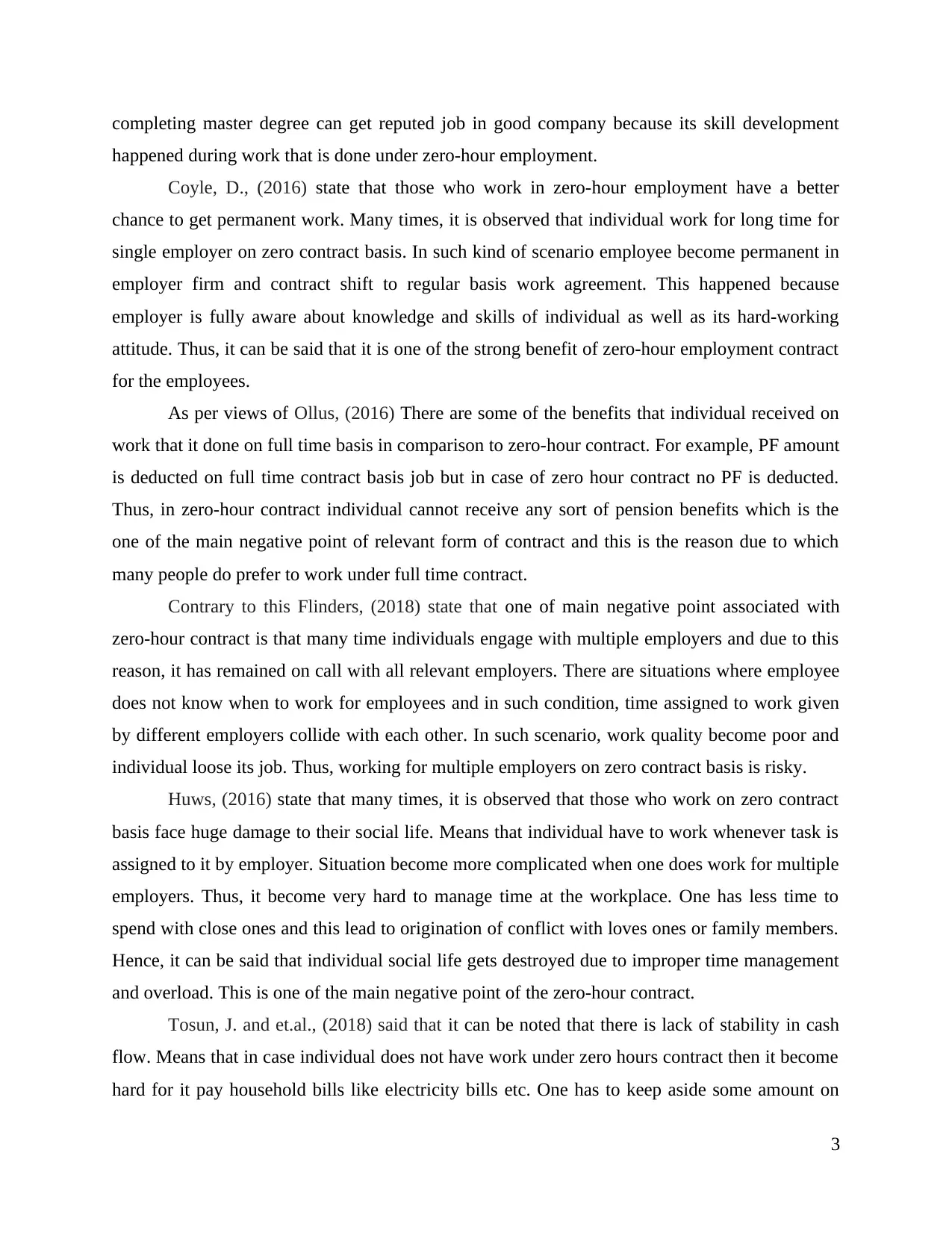
completing master degree can get reputed job in good company because its skill development
happened during work that is done under zero-hour employment.
Coyle, D., (2016) state that those who work in zero-hour employment have a better
chance to get permanent work. Many times, it is observed that individual work for long time for
single employer on zero contract basis. In such kind of scenario employee become permanent in
employer firm and contract shift to regular basis work agreement. This happened because
employer is fully aware about knowledge and skills of individual as well as its hard-working
attitude. Thus, it can be said that it is one of the strong benefit of zero-hour employment contract
for the employees.
As per views of Ollus, (2016) There are some of the benefits that individual received on
work that it done on full time basis in comparison to zero-hour contract. For example, PF amount
is deducted on full time contract basis job but in case of zero hour contract no PF is deducted.
Thus, in zero-hour contract individual cannot receive any sort of pension benefits which is the
one of the main negative point of relevant form of contract and this is the reason due to which
many people do prefer to work under full time contract.
Contrary to this Flinders, (2018) state that one of main negative point associated with
zero-hour contract is that many time individuals engage with multiple employers and due to this
reason, it has remained on call with all relevant employers. There are situations where employee
does not know when to work for employees and in such condition, time assigned to work given
by different employers collide with each other. In such scenario, work quality become poor and
individual loose its job. Thus, working for multiple employers on zero contract basis is risky.
Huws, (2016) state that many times, it is observed that those who work on zero contract
basis face huge damage to their social life. Means that individual have to work whenever task is
assigned to it by employer. Situation become more complicated when one does work for multiple
employers. Thus, it become very hard to manage time at the workplace. One has less time to
spend with close ones and this lead to origination of conflict with loves ones or family members.
Hence, it can be said that individual social life gets destroyed due to improper time management
and overload. This is one of the main negative point of the zero-hour contract.
Tosun, J. and et.al., (2018) said that it can be noted that there is lack of stability in cash
flow. Means that in case individual does not have work under zero hours contract then it become
hard for it pay household bills like electricity bills etc. One has to keep aside some amount on
3
happened during work that is done under zero-hour employment.
Coyle, D., (2016) state that those who work in zero-hour employment have a better
chance to get permanent work. Many times, it is observed that individual work for long time for
single employer on zero contract basis. In such kind of scenario employee become permanent in
employer firm and contract shift to regular basis work agreement. This happened because
employer is fully aware about knowledge and skills of individual as well as its hard-working
attitude. Thus, it can be said that it is one of the strong benefit of zero-hour employment contract
for the employees.
As per views of Ollus, (2016) There are some of the benefits that individual received on
work that it done on full time basis in comparison to zero-hour contract. For example, PF amount
is deducted on full time contract basis job but in case of zero hour contract no PF is deducted.
Thus, in zero-hour contract individual cannot receive any sort of pension benefits which is the
one of the main negative point of relevant form of contract and this is the reason due to which
many people do prefer to work under full time contract.
Contrary to this Flinders, (2018) state that one of main negative point associated with
zero-hour contract is that many time individuals engage with multiple employers and due to this
reason, it has remained on call with all relevant employers. There are situations where employee
does not know when to work for employees and in such condition, time assigned to work given
by different employers collide with each other. In such scenario, work quality become poor and
individual loose its job. Thus, working for multiple employers on zero contract basis is risky.
Huws, (2016) state that many times, it is observed that those who work on zero contract
basis face huge damage to their social life. Means that individual have to work whenever task is
assigned to it by employer. Situation become more complicated when one does work for multiple
employers. Thus, it become very hard to manage time at the workplace. One has less time to
spend with close ones and this lead to origination of conflict with loves ones or family members.
Hence, it can be said that individual social life gets destroyed due to improper time management
and overload. This is one of the main negative point of the zero-hour contract.
Tosun, J. and et.al., (2018) said that it can be noted that there is lack of stability in cash
flow. Means that in case individual does not have work under zero hours contract then it become
hard for it pay household bills like electricity bills etc. One has to keep aside some amount on
3
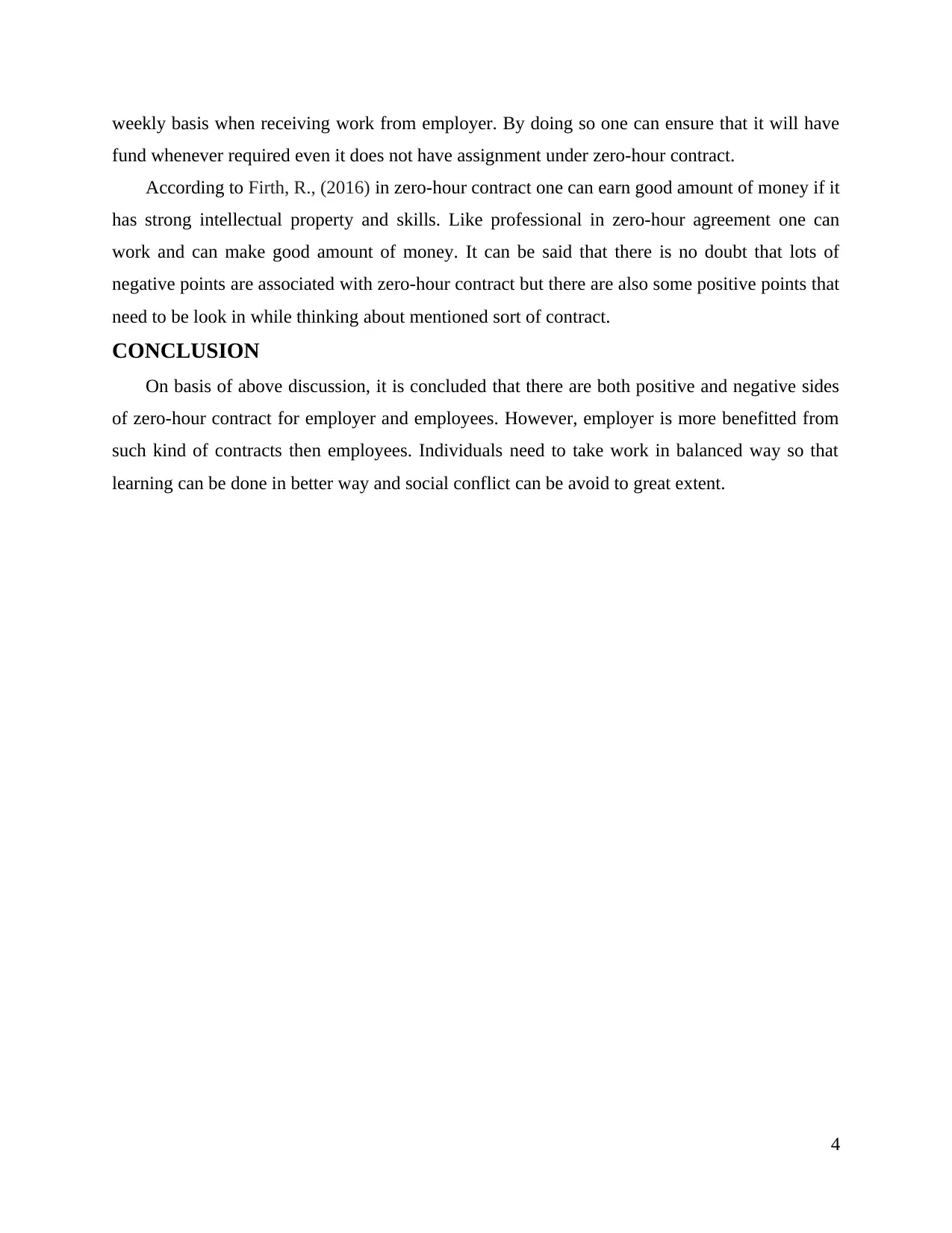
weekly basis when receiving work from employer. By doing so one can ensure that it will have
fund whenever required even it does not have assignment under zero-hour contract.
According to Firth, R., (2016) in zero-hour contract one can earn good amount of money if it
has strong intellectual property and skills. Like professional in zero-hour agreement one can
work and can make good amount of money. It can be said that there is no doubt that lots of
negative points are associated with zero-hour contract but there are also some positive points that
need to be look in while thinking about mentioned sort of contract.
CONCLUSION
On basis of above discussion, it is concluded that there are both positive and negative sides
of zero-hour contract for employer and employees. However, employer is more benefitted from
such kind of contracts then employees. Individuals need to take work in balanced way so that
learning can be done in better way and social conflict can be avoid to great extent.
4
fund whenever required even it does not have assignment under zero-hour contract.
According to Firth, R., (2016) in zero-hour contract one can earn good amount of money if it
has strong intellectual property and skills. Like professional in zero-hour agreement one can
work and can make good amount of money. It can be said that there is no doubt that lots of
negative points are associated with zero-hour contract but there are also some positive points that
need to be look in while thinking about mentioned sort of contract.
CONCLUSION
On basis of above discussion, it is concluded that there are both positive and negative sides
of zero-hour contract for employer and employees. However, employer is more benefitted from
such kind of contracts then employees. Individuals need to take work in balanced way so that
learning can be done in better way and social conflict can be avoid to great extent.
4
⊘ This is a preview!⊘
Do you want full access?
Subscribe today to unlock all pages.

Trusted by 1+ million students worldwide
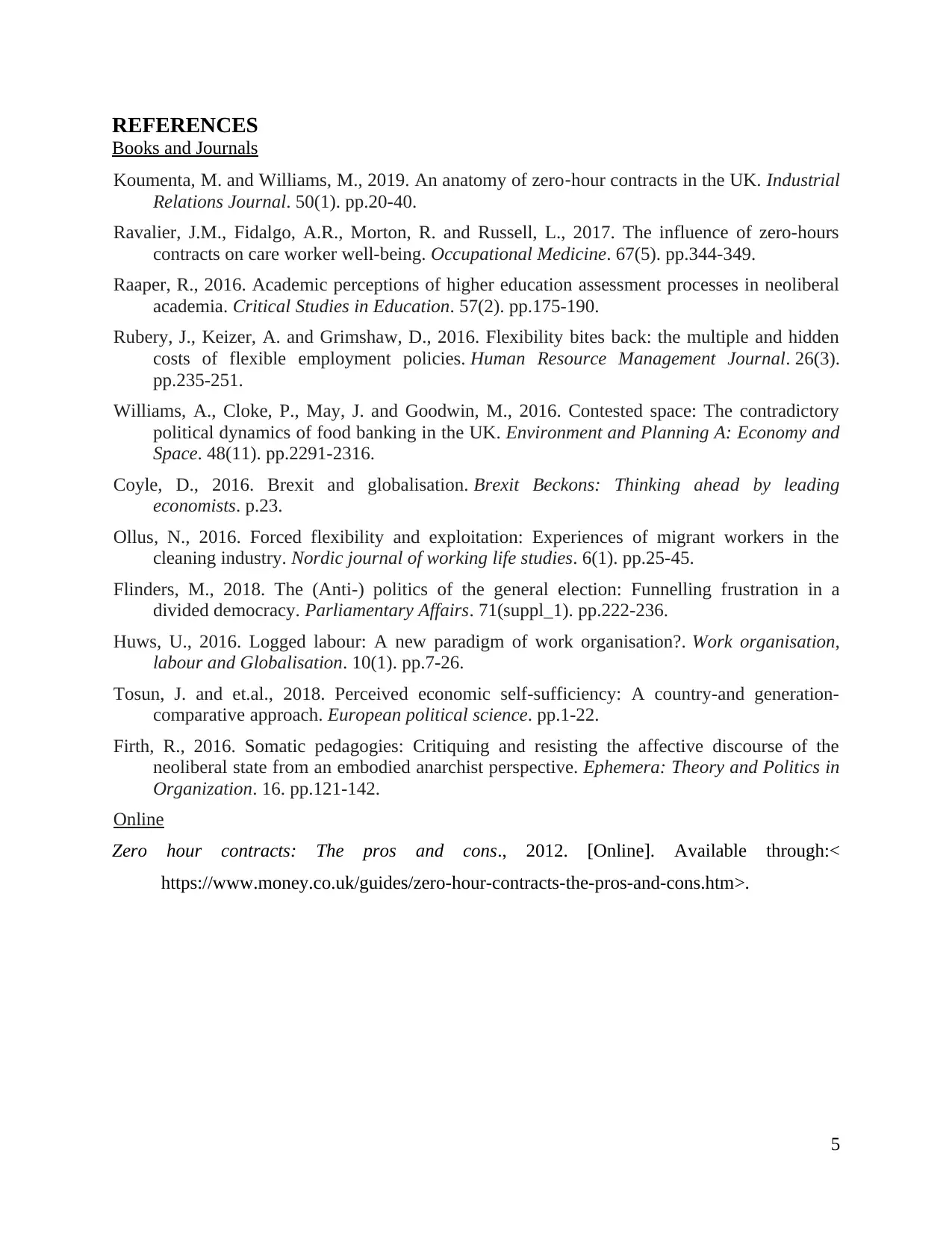
REFERENCES
Books and Journals
Koumenta, M. and Williams, M., 2019. An anatomy of zero‐hour contracts in the UK. Industrial
Relations Journal. 50(1). pp.20-40.
Ravalier, J.M., Fidalgo, A.R., Morton, R. and Russell, L., 2017. The influence of zero-hours
contracts on care worker well-being. Occupational Medicine. 67(5). pp.344-349.
Raaper, R., 2016. Academic perceptions of higher education assessment processes in neoliberal
academia. Critical Studies in Education. 57(2). pp.175-190.
Rubery, J., Keizer, A. and Grimshaw, D., 2016. Flexibility bites back: the multiple and hidden
costs of flexible employment policies. Human Resource Management Journal. 26(3).
pp.235-251.
Williams, A., Cloke, P., May, J. and Goodwin, M., 2016. Contested space: The contradictory
political dynamics of food banking in the UK. Environment and Planning A: Economy and
Space. 48(11). pp.2291-2316.
Coyle, D., 2016. Brexit and globalisation. Brexit Beckons: Thinking ahead by leading
economists. p.23.
Ollus, N., 2016. Forced flexibility and exploitation: Experiences of migrant workers in the
cleaning industry. Nordic journal of working life studies. 6(1). pp.25-45.
Flinders, M., 2018. The (Anti-) politics of the general election: Funnelling frustration in a
divided democracy. Parliamentary Affairs. 71(suppl_1). pp.222-236.
Huws, U., 2016. Logged labour: A new paradigm of work organisation?. Work organisation,
labour and Globalisation. 10(1). pp.7-26.
Tosun, J. and et.al., 2018. Perceived economic self-sufficiency: A country-and generation-
comparative approach. European political science. pp.1-22.
Firth, R., 2016. Somatic pedagogies: Critiquing and resisting the affective discourse of the
neoliberal state from an embodied anarchist perspective. Ephemera: Theory and Politics in
Organization. 16. pp.121-142.
Online
Zero hour contracts: The pros and cons., 2012. [Online]. Available through:<
https://www.money.co.uk/guides/zero-hour-contracts-the-pros-and-cons.htm>.
5
Books and Journals
Koumenta, M. and Williams, M., 2019. An anatomy of zero‐hour contracts in the UK. Industrial
Relations Journal. 50(1). pp.20-40.
Ravalier, J.M., Fidalgo, A.R., Morton, R. and Russell, L., 2017. The influence of zero-hours
contracts on care worker well-being. Occupational Medicine. 67(5). pp.344-349.
Raaper, R., 2016. Academic perceptions of higher education assessment processes in neoliberal
academia. Critical Studies in Education. 57(2). pp.175-190.
Rubery, J., Keizer, A. and Grimshaw, D., 2016. Flexibility bites back: the multiple and hidden
costs of flexible employment policies. Human Resource Management Journal. 26(3).
pp.235-251.
Williams, A., Cloke, P., May, J. and Goodwin, M., 2016. Contested space: The contradictory
political dynamics of food banking in the UK. Environment and Planning A: Economy and
Space. 48(11). pp.2291-2316.
Coyle, D., 2016. Brexit and globalisation. Brexit Beckons: Thinking ahead by leading
economists. p.23.
Ollus, N., 2016. Forced flexibility and exploitation: Experiences of migrant workers in the
cleaning industry. Nordic journal of working life studies. 6(1). pp.25-45.
Flinders, M., 2018. The (Anti-) politics of the general election: Funnelling frustration in a
divided democracy. Parliamentary Affairs. 71(suppl_1). pp.222-236.
Huws, U., 2016. Logged labour: A new paradigm of work organisation?. Work organisation,
labour and Globalisation. 10(1). pp.7-26.
Tosun, J. and et.al., 2018. Perceived economic self-sufficiency: A country-and generation-
comparative approach. European political science. pp.1-22.
Firth, R., 2016. Somatic pedagogies: Critiquing and resisting the affective discourse of the
neoliberal state from an embodied anarchist perspective. Ephemera: Theory and Politics in
Organization. 16. pp.121-142.
Online
Zero hour contracts: The pros and cons., 2012. [Online]. Available through:<
https://www.money.co.uk/guides/zero-hour-contracts-the-pros-and-cons.htm>.
5
1 out of 7
Related Documents
Your All-in-One AI-Powered Toolkit for Academic Success.
+13062052269
info@desklib.com
Available 24*7 on WhatsApp / Email
![[object Object]](/_next/static/media/star-bottom.7253800d.svg)
Unlock your academic potential
Copyright © 2020–2026 A2Z Services. All Rights Reserved. Developed and managed by ZUCOL.





